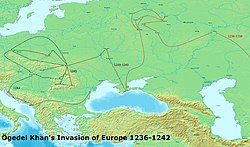
Back الغزو المغولي لروس Arabic Мангола-татарскае нашэсце на Русь Byelorussian Монголско нашествие в Киевска Рус Bulgarian Invasió mongola de la Rus de Kíev Catalan Mongolský vpád na Rus Czech Mongolernes invasion af Rus' Danish Mongolische Invasion der Rus German Invasión mongola de la Rus de Kiev Spanish Mongolite invasioon Venemaale Estonian حمله مغول به روس کییف Persian
This article needs additional citations for verification. (May 2023) |
| Mongol invasion of Kievan Rus' | |||||||||
|---|---|---|---|---|---|---|---|---|---|
| Part of the Mongol invasion of Europe | |||||||||
 The Mongol invasion of Europe, 1236–1242 | |||||||||
| |||||||||
| Belligerents | |||||||||
|
Mongol Empire Golden Horde | |||||||||
| Commanders and leaders | |||||||||
| Strength | |||||||||
| c. 60,000[1] | c. 25,000–50,000 total including garrisons and tribesmen[2][a] | ||||||||
| Casualties and losses | |||||||||
| Heavy | Very heavy | ||||||||
| History of East Slavs |
|---|
| Middle Ages |
| Early modern period |
| Late modern period |
| Post-Soviet states |
| History of states |
The Mongol Empire invaded and conquered much of Kievan Rus' in the mid-13th century, sacking numerous cities such as Ryazan, Yaroslavl, Pereyaslavl and Vladimir, including the largest: Kiev (50,000 inhabitants) and Chernigov (30,000 inhabitants). The siege of Kiev in 1240 by the Mongols is generally held to mark the end of the state of Kievan Rus',[4][5] which had already been undergoing fragmentation.[6] Many other principalities and urban centres in the northwest and southwest escaped complete destruction or suffered little to no damage from the Mongol invasion, including Galicia–Volhynia, Pskov, Smolensk, Polotsk, Vitebsk, and probably Rostov and Uglich.[4][7][8][9]
The campaign was heralded by the Battle of the Kalka River in May 1223, which resulted in a Mongol victory over the forces of several principalities as well as the remnants of the Cumans under Köten. The Mongols retreated, having gathered their intelligence, which was the purpose of the reconnaissance-in-force. A full-scale invasion by Batu Khan followed, with most of Kievan Rus' overran in 1237–1238.[6] The Mongols captured Kiev in 1240 and moved west into Hungary and Poland.[6] The heavy losses suffered by the Mongols during the invasion period significantly weakened subsequent campaigns, preventing the ruin of the Holy Roman Empire and more western countries.[10][11]
The invasion was ended by the Mongol succession process upon the death of Ögedei Khan. Even those principalities who avoided physical conquest, were eventually forced to accept Mongol supremacy in the form of tribute – as in the case of Galicia-Volhynia, Polotsk and Novgorod – if not outright vassalage, of the Golden Horde, until well into the 14th century.[5] Although a Russian army defeated the Mongols at the Battle of Kulikovo in 1380, the Mongolian demands of tribute from Russian princes continued until about 1480.[6]
- ^ Khrustalev 2008, p. 63.
- ^ Fennell, John. "The Crisis of Medieval Russia: 1200–1304". London, 1983. p. 85: "If we assume that each of the larger cities could field, say, between 3,000 and 5,000 men, we can arrive at a total of about 60,000 fighting troops. If we add to this another 40,000 from smaller towns and from the various Turkic allies in the Principality of Kiev, then the total coincides with the 100,000 estimated by S. M. Solov'ev in his History of Russia. But then this is only a rough estimate of the potential number. We have no idea how many, towns and districts actually mustered troops- for instance, it seems highly unlikely that Novgorod sent any at all. Certainly, none came to help their outpost at Torzhok. Perhaps then half or a quarter – or even a smaller fraction- of the total was the most the Russians could muster."
- ^ Khrustalev 2008, pp. 98–99.
- ^ a b Plokhy, Serhii (2015). The gates of Europe : a history of Ukraine. New York: Basic Books. pp. (p. 48–52). ISBN 9780465050918.
- ^ a b "Rusland §2. Het Rijk van Kiëv". Encarta Encyclopedie Winkler Prins (in Dutch). Microsoft Corporation/Het Spectrum. 2002.
- ^ a b c d Cite error: The named reference
:0was invoked but never defined (see the help page). - ^ Halperin 1987, p. 99.
- ^ Martin, Michael (17 April 2017). City of the Sun: Development and Popular Resistance in the Pre-Modern West. Algora Publishing. ISBN 978-1-62894-281-1.
- ^ "The Mongol Invasion of Russia in the 13th Century | Study.com". Study.com. Retrieved 15 May 2017.
- ^ Khrustalev 2008, pp. 131–132.
- ^ Pashuto, Vladimir (1950). Grekov, Boris (ed.). Очерки по истории Галицко-Волынской Руси [Essays on the history of Galician-Volhynian Rus'] (in Russian). Moscow: Издательство академии наук СССР. pp. 221–222.
Cite error: There are <ref group=lower-alpha> tags or {{efn}} templates on this page, but the references will not show without a {{reflist|group=lower-alpha}} template or {{notelist}} template (see the help page).
© MMXXIII Rich X Search. We shall prevail. All rights reserved. Rich X Search